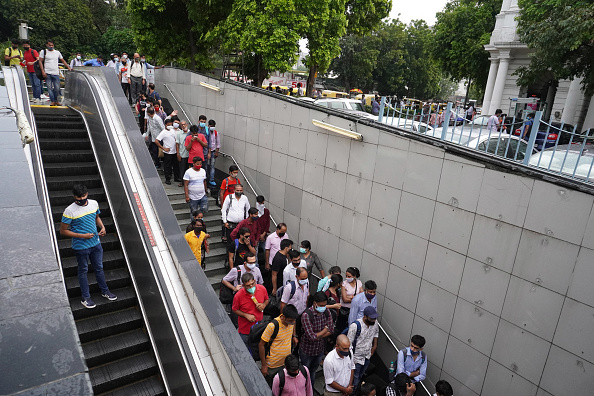
Weekend curfews and night curfews have been imposed as precautionary steps. Cover : Getty Images
Long queues can be seen outside the Rajiv Chowk metro station with commuters having to wait upto 50 min to reach the platforms, they are allowed to enter the station from only two gates. While only one gate is open at stations with less footfall, at busy stations like Rajiv Chowk two gates are open.
On 26th of July, Metro allowed full seating capacity of all train coaches which were earlier allowed to occupy only 50% seats to ensure social distancing measures are followed. It made 16 additional entry gates operational at stations including Janakpuri West, Karol Bagh, Vaishali, Kashmere Gate, Central Secretariat and MG Road. Still, single entry at most other stations are increasing waiting time.
Now, the average time is upto 70-80 mins on certain days, as passengers keep waiting for their chance to enter the metro. Stations like GTB Nagar, ITO, Patel Chowk which function smoothly without waiting except during peak hours are taking more than usual times. At ITO, some days it takes upto 30- 35 minutes to enter the station.
However, It is benefiting the auto drivers as passengers would often ask them to drop at some other station where the queue is smaller. At many stations some auto drivers are keeping an eye on passengers, who would feel discouraged to continue their wait in the queue at the metro station which is proceeding at snail’s speed and decide to take auto.
Akash, a passenger at Rajiv Chowk said, “I came to Rajiv Chowk after a month, and I can’t enter inside now. I will now take an auto till Janpath, I am sure, I will not have to wait in a queue there.”
In a statement DMRC last month said that if more gates are opened, it would be tough to manage crowds. Since only sitting is allowed and standing is still not allowed inside trains, as per the guidelines issued by the Delhi Disaster Management Authority (DDMA). “With the entire fleet of DMRC about 2000 coaches in operation, the total sitting capacity available is only about 1 lakh (2000X50).” said Anuj Dayal, Executive Director Corporate Communications. During peak hours every day more than 2 lakh passengers come to the Metro stations. As sitting is not available for this many people. “This will obviously lead to a large number of passengers having to wait outside the stations.”
“It is thus necessary to restrict the number of gates since if more gates are opened, it will be difficult to regulate the number of passengers inside the trains. This is the reason why a limited number of gates are opened. In any case, opening more gates will not help as the number of passengers allowed inside the train are limited to sitting only. Opening more gates will only cause crowding and violations of social distancing norms inside the trains and stations.”
When we asked the DMRC officials when all gates would be opened, they said it all depends on DDMA. “Since DDMA has only allowed sitting passengers as per Covid norms. As and when any order comes, we will open all gates.”
Still, in the last few weeks the metro is seeing many passengers standing, as people are traveling more in numbers. But DMRC has said that standing capacity makes up 80% of total capacity, so it is taking passengers time so that coming traffic of passengers can be accommodated.
Dayal also pointed out that, “some random incidents have also been reported from across the network during peak hours wherein, impatient passengers have tried to barge into the Metro stations breaking the queues, opening/damaging the gates forcibly, manhandling the DMRC and CISF personnel on duty, in abundant violation of Covid appropriate behaviour.”
“Such acts not only cause law and order issues but also put the lives of co-passengers and Metro officials at risk besides increasing the risk of Covid spread.”
He appealed to passengers, “in view of the current restrictions which permit Metro to offer only limited number of passengers, DMRC once again advice and appeals to the general public to travel during peak hours only when it is absolutely essential and as far as possible plan the journey during off-peak hours to avail better capacity than peak hours, avoiding long queues.”
On the principle of 'Sarvajan Hitaya, Sarvajan Sukhaya' -- Welfare for all, Happiness for all…
With hundreds reported missing in Delhi this year, this guide explains how families can use…
The case came to light after a 35-year-old woman from Panipat alleged that she had…
During the investigation, CCTV footage helped identify the suspects, according to Delhi Police
The launch took place during the inauguration of the Delhi Police Exhibition Hall at Connaught…
The 28-year-old factory owner was taken to Satyawadi Raja Harish Chandra Hospital in Delhi, while…